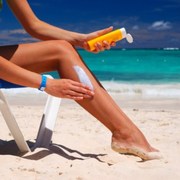 Hemera/Thinkstock
Hemera/Thinkstock
Do sunscreens protect us from skin cancer? Or then again are they just an inconvenience that does nothing at all? Do they make us more vulnerable to skin cancer?
Ironically some research has suggested that sunscreen users may be at greater risk for melanoma. Whether they spend more time in the sun feeling impervious, or whether the chemicals in the sunscreen create a better cancer-causing environment, is unknown.
These questions have been being asked for years now. The answers you get will depend on who you ask and who is answering.
The Environmental Working Group has put together some answers in their 2012 Sunscreen Guide.
EWG has found that only 25 percent of 800 sunscreens tested are actually offering you any safety from sun damage without any dangerous ingredients in them.
EWG said that a safe sunscreen is one that has no retinyl palmitate or oxybenzone, and that has an SPF that is 50 or lower, and that offers real protection from both UVA and UVB rays.
Oxybenzone is in 56 percent of all sport and beach sunscreens. The American Academy of Dermatology and the Food and Drug Administration have declared oxybenzone to be hazard-free.
However, EWG and many other toxicology experts have said that hormone disruption and possibly damage to cells that can lead to skin cancer are all linked to the use of oxybenzone.
Retinyl palminate, a type of vitamin A, has been found by government studies to potentially increase risk of skin cancer in mice.
EWG is encouraged to observe that less sunscreens this year contain retinyl palmitate than last year. They said that it does not make sunscreen work better so avoiding this ingredient is a caution that would be well-advised.
EWG as well as most dermatologists recommend broad spectrum sunscreens that protect against UVB and UVA rays. Sunburn is caused by UVB rays. Aging and skin damage are caused by UVA rays.
EWG said that very high SPFs can give the consumer a misleading and unfounded sense of security when in the sun, thinking the protection is greater than it really is. An SPF of 50 is the highest recommended level for sunscreen.
EWG also reminded the consumer that no matter what the SPF, it does not protect against UVA rays.
The FDA has conceded that studies have not proven that suncscreen alone offers protection from cancer and skin damage.
The International Agency for Research on Cancer has said that sunscreens are not the best protection, and should not be counted on solely to protect skin, from cancer. Instead the IARC strongly encourages the consumer to go the route of protective hats, clothes and seeking shade.
Members of the EWG emphasize that they personally use sunscreen, but they also wear clothes that offer protection from the sun's rays, and try to stay out of the sun in the peak mid-day hours.
Sources:
Avoid sunscreens with potentially harmful ingredients, group warns
http://www.cnn.com/2012/05/16/health/sunscreen-report/index.html
Does Sunscreen Really Protect You?
http://environment.about.com/od/healthenvironment/a/sunscreen.htm
Sunscreens Exposed: Nine Surprising Truths
http://breakingnews.ewg.org/2012sunscreen/sunscreens-exposed/sunscreens-...
Health Agencies Question Sunscreen Efficacy
http://breakingnews.ewg.org/2012sunscreen/sunscreens-exposed/health-agen...
Visit Jody's website and blog at http://www.ncubator.ca and http://ncubator.ca/blogger
Reviewed on May 17, 2012
by Maryann Gromisch, RN





Add a CommentComments
There are no comments yet. Be the first one and get the conversation started!